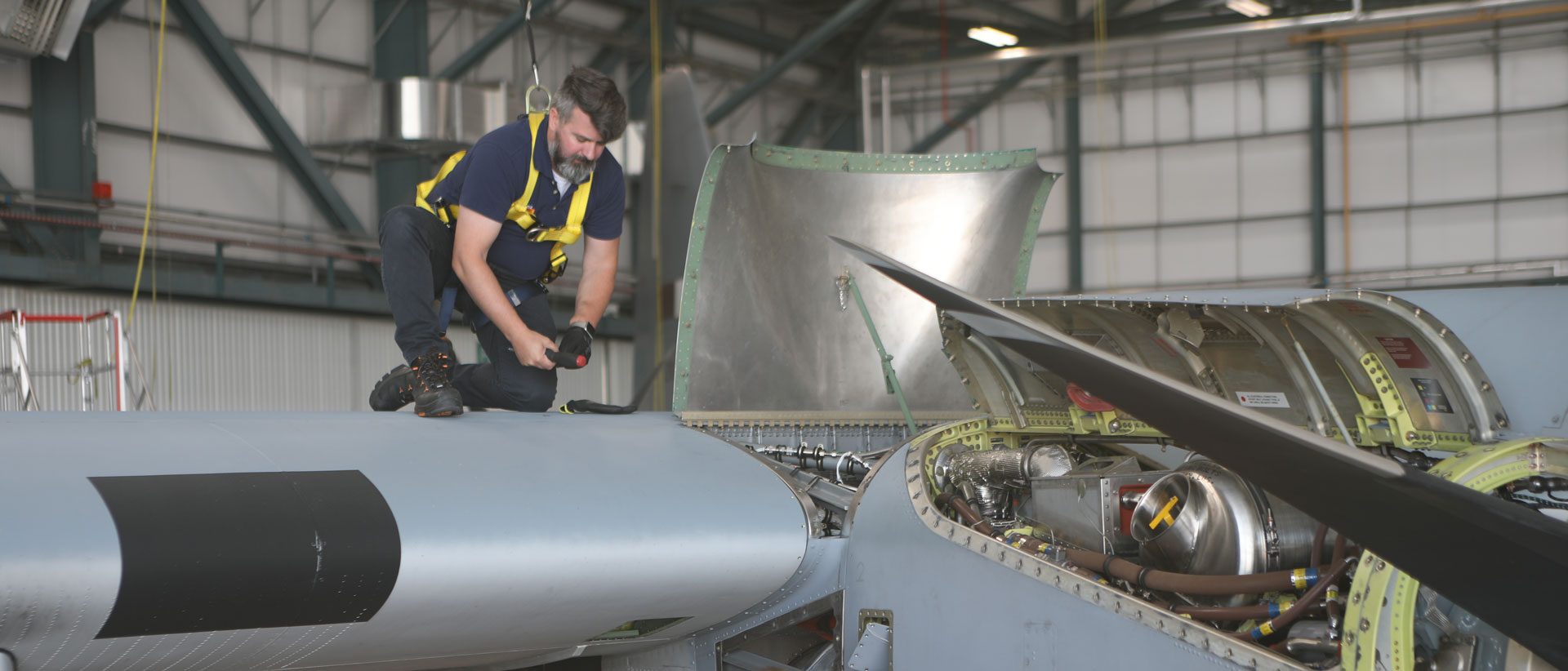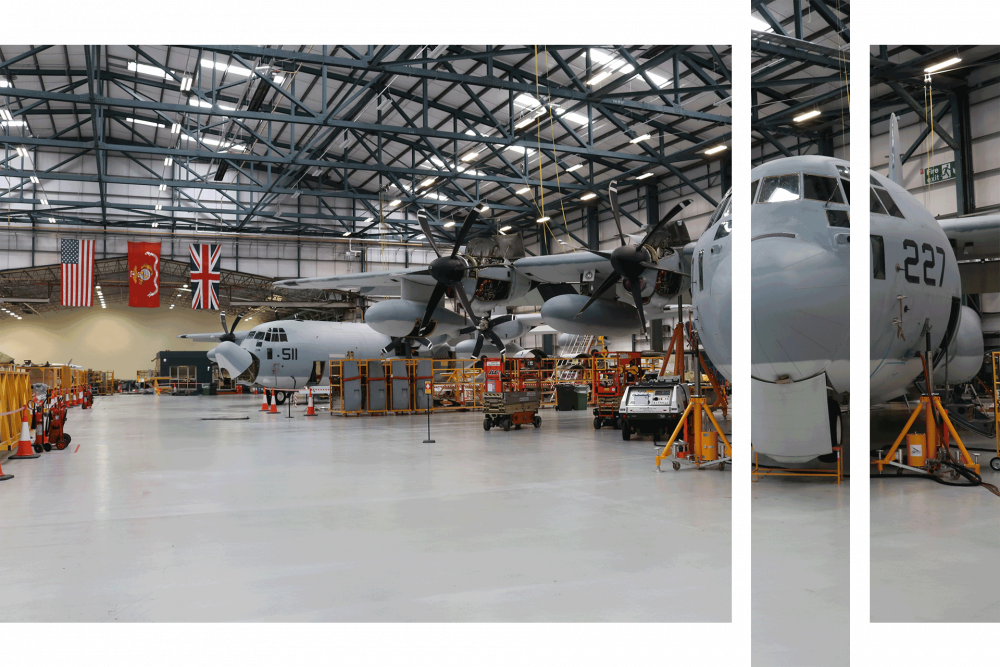
Parts and components manufacture
Marshall’s in-house parts and components manufacturing team produces high-quality, certified aerospace parts and components, backed by state-of-the-art equipment and decades of expertise.
Marshall is recognised as a global authority on maintenance, repair and overhaul (MRO) for the Lockheed Martin C-130 Hercules, having built unrivalled experience on the platform since 1966.
Around the world, 17 government fleet operators rely on our capabilities to remain mission-ready and mission-capable - regardless of whether they are operating a 60-year-old C-130B or the latest C-130J Super Hercules. In 2024 alone, Marshall completed nearly 30,000 MRO tasks across 442,000 hours of aircraft work.
"Marshall managers have a keen ability to quickly adjust production plans and schedules and contain a broad range of risks to deliver on time to contract delivery dates.
They routinely and enthusiastically handled a multitude of issues, successfully maintaining constant surge capacity operations by executing scheduled inputs alongside short notice customer service and ISR work request aircraft."
U.S. Marine Corps Contractor Performance Assessment Report
NAVSUP Fleet Logistics Center Yokosuka
We continue to set the industry standard for accurate scheduling and management of maintenance inputs, delivering high-quality, low-risk C-130 depth maintenance with dependable turnaround times. Our exceptionally skilled team of qualified fitters and technicians is supported by our unique authorisation to produce parts in-house, as well as our resilient supply chain and component repair and overhaul network.
Marshall’s current HMC and HSC approvals and associated technical assistance agreements enable us to support legacy C-130 and C-130J Super Hercules aircraft maintenance requirements at our facilities.
Furthermore, these approvals enable Marshall to provide technical support to customers at their home bases and to their areas of operation through highly skilled and experienced contractor working parties.
Marshall fully understands the importance of fleet availability, capability and airworthiness, together with the associated challenges for specific military operations. We have developed a unique capability to provide tailored support solutions to meet the requirements of many different military operators.
Based on this experience, Marshall has developed best practices that are further enhanced by a continuous improvement process, leading to accurate scheduling and managing of depth maintenance inputs. At its Cambridge, UK site Marshall has 14 slots dedicated to delivering high quality, low risk C-130 depth maintenance by 300 fully qualified and experienced aircraft personnel to support the scheduled and unscheduled maintenance, repair and overhaul requirements.
All of which is underpinned by a comprehensive engineering and technical support team and an established supply chain and component repair and overhaul network.
“Marshall is an esteemed partner to Lockheed Martin, representing the gold-standard of excellence in MRO: high-quality, low-risk, dependable turnaround times.
"Marshall has played a major role in the platform’s success and will continue to shape the future of the global Hercules operating community.”
Danya Trent
Vice President of Air Mobility & Maritime Missions, Lockheed Martin
Marshall possesses a comprehensive set of non-destructive testing (NDT) capabilities, providing seamless support to our MRO operations.
Our expert NDT team operates entirely in-house, saving aircraft operators the logistical complexity, delays and costs of transferring work between organisations, while ensuring accountability always rests with Marshall throughout the MRO process.
We are fully equipped and trained to EN4179/NAS410 Level 2 and 3 to write techniques, authorise and deliver all the primary methods of NDT on aircraft in accordance with customer specifications:
We offer low-cost type 1 fluorescent penetrant testing, exposing surface-breaking defects on all materials. As needed, we can select penetrants with the appropriate level of sensitivity for specific applications, and we have access to both water-washable and solvent-removeable techniques.
Our magnetic testing approaches enable rapid detection and analysis of surface and near subsurface defects in ferrous metallic surfaces and complex parts, including rolled products, castings, forgings and welds. We are able to offer longitudinal and circular magnetic field testing, depending on the type and shape of surface being tested.
We conduct a wide range of eddy testing inspections, ranging from high to low frequency methods for surface, subsurface and bolt holes, enabling the immediate detection of flaws and cracks at various depths on different types of conductive materials. We maintain a comprehensive selection of portable equipment, including specialised probes for complex surfaces. In addition to flaw detection, our eddy tests can gauge the depth of material loss during blind side corrosion checks, measure the depth of nonconductive coatings, and monitor the properties of materials.
Our NDT team uses ultrasonic testing for a number of purposes across metallic and composite materials, including surface and subsurface flaw detection, gauging thickness of materials looking for effects of erosion/corrosion, assessment of bond integrity and estimation of void content. We are able to optimise our inspections to specific applications, thanks to our wide variety of transducer bandwidths, sizes and frequency ranges.
When other NDT approaches are impossible or impractical, our team can conduct radiographic inspections of assembled components or inaccessible parts of aircraft structures. Our tests can be conducted in hangars or inspection booths, and cover a practically limitless range of material types and densities. We use radiography to detect surface and subsurface defects, as well as corrosion, voids, cracks, and changes in thickness or density.
"Throughout the years, we have transformed the relationship into one of cooperating and partnering. The Royal Netherlands Air Force provides the operational input, while Marshall delivers the engineering solutions – a proven and rock solid combination.
“If technical problems arise, Marshall is immediately around to support the Royal Netherlands Air Force. This focus on the customer’s true needs really distinguishes Marshall in the aerospace industry.”
Major General Sotthewes
Deputy Commander, Royal Netherlands Air Force
In 2020, Marshall was awarded a ten-year contract to provide maintenance for the fleet of KC-130J aircraft operated by the United States Marine Corps (USMC) outside the continental United States.
The contract was one of the biggest in the company’s history and rapidly opened the door for scheduled and unscheduled maintenance, repair and overhaul (MRO) work on one of the world’s largest C-130 fleets.
Since then, Marshall has steadily grown and sustained its strong relationship with the USMC by providing an unmatched level of quality, efficiency and reliability.
Our dedicated repairs group supports aircraft during maintenance at our facilities and at forward locations when required, designing and substantiating non-standard C-130 repairs that maintain the airworthiness and structural integrity of the aircraft, with a particular focus on reducing fatigue.
Drawing from their familiarity of Lockheed Martin’s C-130 drawings and documentation, our dedicated Repairs Liaison Engineers rapidly determine whether an issue can be resolved through a standard repair approach, or whether a non-standard repair is necessary.
In the latter case, Marshall can support customers by manufacturing parts quickly, easily and independently thanks to our OEM-authorised in-house manufacturing and special processes capability.
We produce roughly 2,000 parts per year on average across legacy C-130 models and the current production C-130J Super Hercules. We are proud to have manufactured more parts for more C-130 operators than any other MRO organisation.
This unique capability enables us to significantly de-risk emerging findings during C-130 maintenance inputs, ensuring a highly predictable and low-risk, dependable aircraft turn-around-time.
We can also undertake urgent aircraft repair parts manufacture and support the rapid prototyping of new products, overseeing the full process from planning and purchasing through to manufacture, special processes, inspection and release.
Special processes work is an essential part of our capability offering: our manufacturing support facility is NADCAP-accredited and holds prime contractor approvals from Boeing and Lockheed Martin for welding, testing, chemical processing and heat treatment of materials.
Marshall is pleased to offer a world-class in-house full strip and repaint capability in Cambridge.
Providing our customers with a range of both standard and bespoke aircraft livery and paint schemes, we offer a cost-effective full strip and repaint capability, ensuring a high quality finish, all of which is delivered in-house through our strategic partnership with a specialist provider.
Marshall is approved to conduct extensive ground testing and all categories of military and civil flight test, from experimental and developmental testing through to production and operational trials.
Our CAA/EASA/MAA Cat 1 test pilots and lead flight test engineers have extensive experience of military and civil fixed wing aircraft operations and testing. The team’s range of front line experience includes fast jet, tactical and strategic air transport, intelligence, surveillance and reconnaissance (ISR) and maritime operations.
Marshall is a member of numerous accredited professional bodies including the Royal Aeronautical Society, the Society of Experimental Test Pilots and the Society of Flight Test Engineers.
Marshall maintains the largest Ground Running Enclosure (GRE) and compass swing bay in Europe, measuring 90m wide and 20m high.
The multi-million-pound facility enables us to offer an unmatched engine test service, allowing conditioning of the airflow to the propellers and jet engine intakes and accommodating aircraft up to the size of a Boeing 747-400 – while significantly reducing noise during testing.
Marshall’s dedicated Technical Support Group can ensure the continued airworthiness and enhance the capability of aircraft fleets.
To help minimise the impact of any unforeseen technical issues that may arise during maintenance, the Technical Support Group can provide general technical support and advice, as well as performing fault analysis and investigation work relating to problems discovered during aircraft maintenance.
The group’s highly experienced engineers are world leaders in providing engineering advice, structural repairs, integrated logistics support, reliability-centred maintenance analysis, obsolescence management, structural and systems integrity, fatigue monitoring, fault analysis and amendments to technical publications.
Protecting fleet availability with engineering and technical support:
“It’s important that we can count on our longstanding service centre at Marshall, to support one of the most active C-130J fleets in the world. Through an integrated team and dedicated support, together we can ensure the Indian Air Force’s C-130J fleet is available and ready for every mission.”
Curtis Jones
C-130 India Programme Manager, Lockheed Martin
Importantly, the approvals we hold enable us to provide technical support to customers at their home bases and to their areas of operation through highly skilled and experienced contractor working parties.
Supporting the Lockheed Martin C-130 is in our blood: since 1966 we have led the way in understanding everything about this incredible aircraft.
Understandably, our customers regularly ask us to help to them develop their own capability programmes to support their fleets of legacy aircraft - a need we are fully able to accommodate, providing the necessary skills and knowledge to work proficiently on C-130B through H and J aircraft.
As a UK CAA Part 147 approved training facility, we meet the highest standards of quality assurance and regulatory compliance, enabling us to provide world-class technical training and to conduct examinations at the Aircraft Maintenance License level and perform aircraft type/task training for both the civil and defence sectors on the Lockheed Martin C-130 H, J and L100/382 aircraft.
We work closely with our customers to ensure that all material is developed and delivered to meet their bespoke training and operational requirements. Our teaching staff are professionally qualified instructors, with many years of industrial and military experience in the aerospace sector.
We also have the flexibility to deliver training courses at customer facilities to further support the local development of skills and capabilities.



